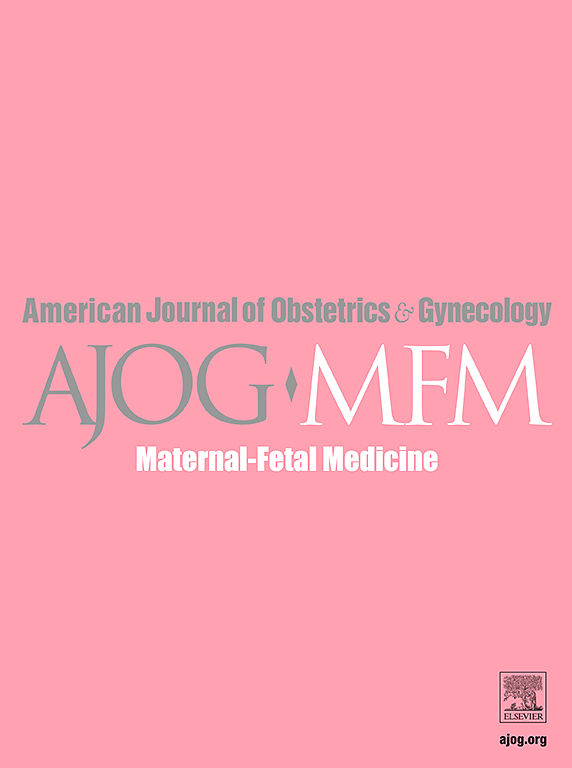Postpartum diuretic administration and hospital readmission: a systematic review and meta-analysis
IF 3.1
2区 医学
Q1 OBSTETRICS & GYNECOLOGY
American Journal of Obstetrics & Gynecology Mfm
Pub Date : 2025-07-02
DOI:10.1016/j.ajogmf.2025.101738
引用次数: 0
Abstract
Objective
We aimed to determine if postpartum administration of loop diuretic therapy among patients at risk of or diagnosed with a hypertensive disorder of pregnancy impacts the rate of hospital readmission compared to typical care.
Data sources
This study was a systematic review and meta-analysis of randomized controlled trials (RCTs). A research librarian performed a database search using a combination of standardized terms and keywords related to postpartum hypertension and loop diuretics from database inception until February 2025. This study was registered in PROSPERO (registration number CRD42024546708).
Study eligibility criteria
RCTs that compared outcomes between administration of loop diuretic therapy and routine care among postpartum patients at risk of or diagnosed with a hypertensive disorder of pregnancy were included. Inclusion criteria and diagnosis of hypertensive disorder of pregnancy were defined per each trial’s protocol. Nonrandomized trials, quasi-randomized trials, and animal models were excluded. All titles and abstracts obtained through the search were independently assessed by two reviewers using the screening tool in Covidence, and full-text articles were reviewed. A total of 10 articles met inclusion criteria and were included in the systematic review and meta-analysis.
Study appraisal and synthesis methods
Two independent investigators independently abstracted data using a standardized template created in Covidence. The primary outcome was the rate of hospital readmission. Secondary maternal outcomes included readmission for hypertension, mean postpartum blood pressure, and severe maternal morbidity. The risk of bias in each study was assessed using the guidelines outlined in the Cochrane Handbook for Systematic Reviews of Interventions. Heterogeneity was measured using Higgins I2. Meta-analysis was performed in Review Manager 5.4.1 to produce summary treatment effects in terms of relative risk (RR) or mean difference with 95% confidence intervals (CIs).
Results
Ten RCTs, including 1401 patients, were included in the meta-analysis. The rate of hospital readmission, reported in 3 studies, did not differ between administration of loop diuretic therapy and routine care (RR=2.00; 95% CI, 0.71–5.67). The rate of readmission for hypertension also did not differ between groups (3 studies, RR=0.69; 95% CI, 0.35–1.36). Additional antihypertensive requirements were lower in patients who received diuretics (6 studies, RR=0.47; 95% CI, 0.26–0.85). There were no differences in any other secondary maternal outcomes, including discharge on antihypertensives (8 studies, RR=1.00; 95% CI, 0.91–1.11), hospital length of stay (6 studies, mean difference=0.15; 95% CI, –0.18 to 0.48), or severe maternal morbidity.
Conclusion
There is insufficient evidence to support routine prophylactic administration of loop diuretic therapy in the postpartum period to prevent hospital readmission associated with hypertensive disorders of pregnancy. Additional antihypertensive requirements were lower with diuretic use. Additional large trials are needed.

产后利尿剂管理与再入院:系统回顾和荟萃分析。
目的:我们旨在确定与典型护理相比,有妊娠期高血压疾病风险或诊断为妊娠期高血压疾病的患者产后给予利尿剂治疗是否影响再入院率。资料来源:本研究为随机对照试验的系统综述和荟萃分析。一位研究馆员使用标准化术语和关键词组合进行了数据库搜索,这些术语和关键词与产后高血压和循环利尿剂有关,从数据库建立到2025年2月。本研究已在PROSPERO注册(注册号CRD42024546708)。研究:资格。标准:纳入随机对照试验,比较有妊娠期高血压疾病风险或诊断为妊娠期高血压疾病的产后患者给予循环利尿剂治疗和常规护理的结果。妊娠期高血压疾病的纳入标准和诊断是根据每个试验的方案定义的。排除非随机试验、准随机试验和动物模型。通过检索获得的所有标题和摘要由两名审稿人使用covid - encetm中的筛选工具独立评估,并对全文文章进行审查。共有10篇文章符合纳入标准,被纳入系统评价和荟萃分析。研究:APPRAISAL.AND.Synthesis:方法:两名独立研究者使用在covid - encetm中创建的标准化模板独立提取数据。主要观察指标为再入院率。产妇的次要结局包括高血压再入院、平均产后血压和严重的产妇发病率。每项研究的偏倚风险均按照Cochrane干预措施系统评价手册中概述的指南进行评估。异质性采用Higgins I2测量。在Review Manager 5.4.1中进行meta分析,以RR或95%置信区间(ci)的平均差异得出总结治疗效果。结果:meta分析纳入10项随机对照试验,共1401例患者。3项研究报告的再入院率在循环利尿剂治疗和常规护理之间没有差异(RR=2.00;95% ci, 0.71-5.67)。高血压再入院率在两组间也无差异(3项研究,RR=0.69;95% ci, 0.35-1.36)。接受利尿剂治疗的患者额外降压需求较低(6项研究,RR=0.47;95% ci, 0.26-0.85)。其他产妇次要结局包括抗高血压出院均无差异(8项研究,RR=1.00;95% CI, 0.91-1.11)、住院时间(6项研究,平均差异=0.15;95% CI, -0.18-0.48)或严重的产妇发病率。结论:没有足够的证据支持产后常规预防性利尿剂治疗预防妊娠期高血压疾病的再入院。使用利尿剂降低了额外的降压需求。还需要更多的大型试验。
本文章由计算机程序翻译,如有差异,请以英文原文为准。
求助全文
约1分钟内获得全文
求助全文
来源期刊

American Journal of Obstetrics & Gynecology Mfm
Medicine-Medicine (all)
CiteScore
7.40
自引率
3.20%
发文量
254
审稿时长
40 days
期刊介绍:
The American Journal of Obstetrics and Gynecology (AJOG) is a highly esteemed publication with two companion titles. One of these is the American Journal of Obstetrics and Gynecology Maternal-Fetal Medicine (AJOG MFM), which is dedicated to the latest research in the field of maternal-fetal medicine, specifically concerning high-risk pregnancies. The journal encompasses a wide range of topics, including:
Maternal Complications: It addresses significant studies that have the potential to change clinical practice regarding complications faced by pregnant women.
Fetal Complications: The journal covers prenatal diagnosis, ultrasound, and genetic issues related to the fetus, providing insights into the management and care of fetal health.
Prenatal Care: It discusses the best practices in prenatal care to ensure the health and well-being of both the mother and the unborn child.
Intrapartum Care: It provides guidance on the care provided during the childbirth process, which is critical for the safety of both mother and baby.
Postpartum Issues: The journal also tackles issues that arise after childbirth, focusing on the postpartum period and its implications for maternal health. AJOG MFM serves as a reliable forum for peer-reviewed research, with a preference for randomized trials and meta-analyses. The goal is to equip researchers and clinicians with the most current information and evidence-based strategies to effectively manage high-risk pregnancies and to provide the best possible care for mothers and their unborn children.
 求助内容:
求助内容: 应助结果提醒方式:
应助结果提醒方式:


